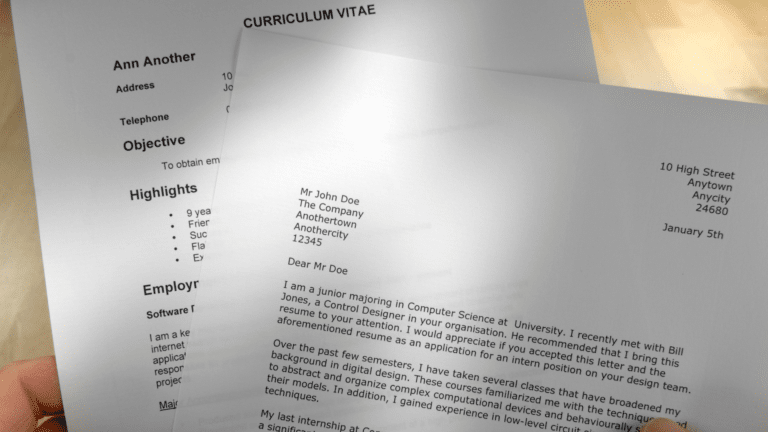Job titles are an important part of any resume, as they provide a quick summary of your professional experience and qualifications. Nowadays, it’s more important than ever to consider the job titles you use on your resume since the market continues to undergo rapid changes.
By being clear and specific when listing job titles on your resume, you accurately represent your experience, emphasize your professional accomplishments, and stand out to potential employers.
Knowing what job titles to add and how to add them to your resume can be a bit tricky, but we’re here to help! Keep on reading to find out more.
Key Takeaways
- Job titles serve as a way to identify a specific role a person has within a business.
- It’s important to use clear and specific job titles to accurately describe your rank and how far you’ve come.
- Try to avoid inflating job titles since that can easily be verified and you might not be considered for the job in the long run.
- Opt for using relevant keywords that are industry specific. This can increase your chances of getting past an ATS scanner.
What is a Job Title?
A job title is a term or label given to a specific position or role within an organization. It defines the nature of the work, the level of responsibility, and the authority associated with that position.
Job titles can vary depending on the function, company, and industry. The terms used to name a job title can be simple (such as “manager” or “teacher”) or more specific (such as “brand manager” or “English teacher”).
Job titles are mostly used in advertisements, resumes, and business cards as a way to describe a person’s professional role.
Why Are Job Titles Important For Resumes?
Job titles can be found in the heading close to your name and contact information, as well as when you list them in the work experience section of your resume. Since titles are the first thing employers look out for, they become highly valuable.
Job titles are important for resumes because they give employers a glance at your professional experience and area of expertise. Titles are used to portray information about your career and accomplishments and can help recruiters figure out whether you have the qualifications they’re looking for.
Job titles can also be helpful when it comes to demonstrating progression. By listing them in reverse chronological order, you can show recruiters how you have evolved over your career.
Lastly, job titles are important for resumes because recruiters will use an applicant tracking system (ATS) to check your resume for specific keywords and job titles. If they’re a match, you increase your chances of landing an interview.
Job Titles Dos and Don’ts
Here are some general dos and don’ts when it comes to job titles:
Do’s:
- Use job titles that reflect the duties of the position.
- Be clear and specific to avoid any confusion or misunderstandings.
- Use job titles that are recognized within your industry.
- Use job titles that are gender-neutral so you avoid any bias or discrimination.
- Opt for job titles that are consistent with industry standards or benchmarks.
Don’ts:
- Avoid job titles that are misleading as this may confuse employers.
- Avoid titles that are too vague such as “analyst” or “marketer”. Be more specific when listing the job title.
- Avoid long titles, as they may be difficult to remember.
- Avoid using job titles that are inflated or exaggerated, as recruiters might run a background check on you.
- Avoid using funny/quirky job titles like “Guru” or “Wiz” as it might make you seem unprofessional.
Job Titles by Industry
Here are some job title examples in some common industries:
#1. IT Job Titles
Some of the most common IT job titles that indicate your IT skills are:
- Software Engineer
- Systems Administrator
- Software Developer
- Web Developer
- IT Manager
- Network Engineer
- Database Administrator
- Cybersecurity Analyst
- Network Administrator
- DevOps Engineer
- Data Analyst
- Cloud Architect
- Technical Support Specialist
- IT Director
- QA (Quality Assurance) Analyst
- IT Project Manager
- Business Analyst
- Cloud Engineer
#2. Sales Job Titles
Some examples of sales job titles are:
- Sales Trainer
- Sales Engineer
- Sales Consultant
- Sales Analyst
- Sales Representative
- Inside Sales Representative
- Outside Sales Representative
- Sales Manager
- Sales Operations Manager
- Business Development Manager
- Territory Sales Manager
- Key Account Manager
- Regional Sales Manager
- Channel Sales Manager
- Customer Success Manager
- Sales Director
- Account Manager
- Brand Ambassador
- Sales Analyst
- Sales Coordinator
- Sales Enablement Specialist
- Sales Development Representative
- Client Manager
#3. Finance Job Titles
The most common finance job titles are:
- Accountant
- Acquisitions Analyst
- Auditor
- Business Analyst
- Credit Analyst
- Chief Financial Officer (CFO)
- Financial Analyst
- Financial Planner
- Financial Controller
- Financial Reporting Manager
- Fund Accountant
- Insurance Underwriter
- Investment Banker
- Mergers Analyst
- Portfolio Manager
- Private Equity Associate
- Quantitative Analyst
- Risk Manager
- Tax Accountant
- Treasure Analyst
- Wealth Manager
#4. Marketing Job Titles
Common job titles in marketing are the following:
- Marketing Manager
- Social Media Marketing Manager
- Content Marketing Manager
- Brand Manager
- Product Manager
- Public Relations Manager
- Product Marketing Manager
- Advertising Manager
- Events Manager
- E-commerce Manager
- Affiliate Marketing Manager
- Email Marketing Specialist
- Digital Marketing Specialist
- Marketing Analyst
- Marketing Coordinator
- Marketing Director
- Market Research Analyst
- SEO Specialist
- Creative Director
#5. Hospitality Job Titles
Some hospitality job titles are:
- Hotel Manager
- Hotel General Manager
- Hotel Operations Manager
- Restaurant Manager
- Banquet Manager
- Guest Service Manager
- Food and Beverage Manager
- Catering Manager
- Guest Relations Manager
- Housekeeping Manager
- Conference Services Manager
- Spa Manager
- Room Service Manager
- Sales Manager
- Revenue Manager
- Valet Manager
- Traveling Coordinator
- Hotel Sales Coordinator
- Event Planner
- Executive Chef
- Reservations Agent
#6. Healthcare Job Titles
Some of the most well-known healthcare job titles are:
- Surgeon
- Nurse
- Optometrist
- Chiropractor
- Dental Hygienist
- Podiatrist
- Health Educator
- Registered Nurse (RN)
- Licensed Practical Nurse (LPN)
- Physician
- Physician Assistant (PA)
- Medical Assistant (MA)
- Nurse Practitioner (NP)
- Physical Therapist
- Occupational Therapist
- Respiratory Therapist
- Ultrasound Technologist
- Medical Records Technician
- Pharmacy Technician
- Clinical Technologist
- Laboratory Technologist
- Radiologic Technologist
- Medical Interpreter
- Home Health Aide
- Health Service Manager
- Health Information Manager
#7. Business Job Titles
Business job titles can be:
- Accountant
- Analyst
- Business Analyst
- Financial Analyst
- Chief Executive Officer (CEO)
- Chief Financial Officer (CFO)
- Chief Operating Officer (COO)
- Chief Information Officer (CIO)
- Compliance Officer
- Corporate Communications Manager
- Brand Manager
- Public Relations Manager
- Social Media Manager
- E-commerce Manager
- Product Manager
- Digital Marketing Manager
- Risk Manager
- Procurement Manager
- Customer Service Manager
- Logistics Manager
- Business Development Manager
- Supply Chain Manager
- Investment Banker
#8. Customer Service Job Titles
Some customer service job titles include:
- Customer Service Representative
- Customer Success Manager
- Customer Experience Specialist
- Customer Service Manager
- Customer Service Supervisor
- Customer Service Trainer
- Customer Service Operations Manager
- Customer Service Account Manager
- Customer Service Team Leader
- CUstomer Care Coordinator
- Customer Relationship Manager
- Customer Support Analyst
- Call Center Agent
- Service Desk Analyst
- Help Desk Technician
- Client Support Analyst
#9. Education Job Titles
Education job titles can be:
- Teacher
- Professor
- Principal
- School Administrator
- Counselor
- Curriculum Developer
- Librarian
- Education Consultant
- School Psychologist
- Research Analyst
- Admissions Counselor
- Career Services Coordinator
- Academic Advisor
- Student Affairs Director
- Special Education Teacher
- Test Administrator
- Admissions Director
- Dean
- Dean of Students
The “teacher” and “professor” positions can be altered based on the topic you have taught. For example “History Teacher” or “History Professor”.
#10. Engineering Job Titles
Some engineering job titles you can use are:
- Engineer
- Electrical Engineer
- Computer Engineer
- Aerospace Engineer
- Civil Engineer
- Mechanical Engineer
- Chemical Engineer
- Biomedical Engineer
- Environmental Engineer
- Industrial Engineer
- Design Engineer
- Project Engineer
- Systems Engineer
- Network Engineer
- Manufacturing Engineer
- Test Engineer
- Mechatronics Engineer
- Traffic Engineer
- Geotechnical Engineer
- Technical Engineer
- Energy Engineer
- Instrumentation Engineer
- Research Engineer
- Control Systems Engineer
- Validation engineer
- Structural Engineer
#11. Construction Job Titles
Well-known construction job titles include:
- Architect
- Engineer
- Electrician
- Plumber
- Foreman
- Estimator
- Welder
- Landscaper
- Roofer
- Surveyor
- Concrete Finisher
- Carpenter
- Intendent
- Painter
- Mason
- Glazier
- Tiler
- Drywaller
- Equipment Operator
- Construction Worker
- Superintendent
- Project Manager
- Safety Manager
- Quality Control Manager
- Construction Manager
- Facilities Manager
- Building Inspector
- Demolition Specialist
- Sustainability Coordinator
- HVAC Technician
- Permit Coordinator
Other Job Titles
Other categories of job titles include:
#1. Executive Job Titles
Some of the most common executive job titles are:
- Chief Executive Officer (CEO)
- Chief Financial Officer (CFO)
- Chief Marketing Officer (CMO)
- Chief Technology Officer (CTO)
- Chief Information Officer (CIO)
- Chief Operation Officer (COO)
- Executive Director
- Finance Director
- Marketing Director
- Operations Director
#2. Human Resources Job Titles
Some job titles in the human resources field can be:
- Human Resources Manager
- Human Resources Generalist
- HR Information Systems Manager
- Compensation and Benefits Manager
- Employee Relations Specialist
- Talent Acquisition Specialist
- Recruiter
#3. Operations Job Titles
Job titles in the operations field can be:
- Operations Manager
- Production Manager
- Business Analyst
- Process Improvement Specialist
- Logistics Coordinator
- Supply Chain Manager
- Inventory Control Specialist
#4. Leadership Job Titles
Some job titles that can help highlight your management and leadership skills are:
- Chief Executive Officer (CEO)
- Director
- President
- Vice President (VP)
- Manager
- Supervisor
- Team Leader
- Project Manager
- Team Manager
#5. Student Job Titles
Even if you haven’t collected a wide array of experiences, you can mention the following job titles on your student resume:
- Research Assistant
- Teaching Assistant
- Library Assistant
- Tutor
- Intern
- Campus Ambassador
- Student Ambassador
Final Thoughts
In a rapidly changing job market, it’s now more important than ever to make sure that your resume showcases your skills, experience, and qualifications accurately. Job titles can be quite helpful in this process, as they give employers a quick look at your professional background.
To fully utilize job titles in 2024, opt for clear and specific titles to reflect your experience and use industry-specific keywords to help your resume get past an ATS scan.
If you follow these tips, you’re sure to communicate your personal accomplishments while also making sure to stand out from the rest of the applicants.










